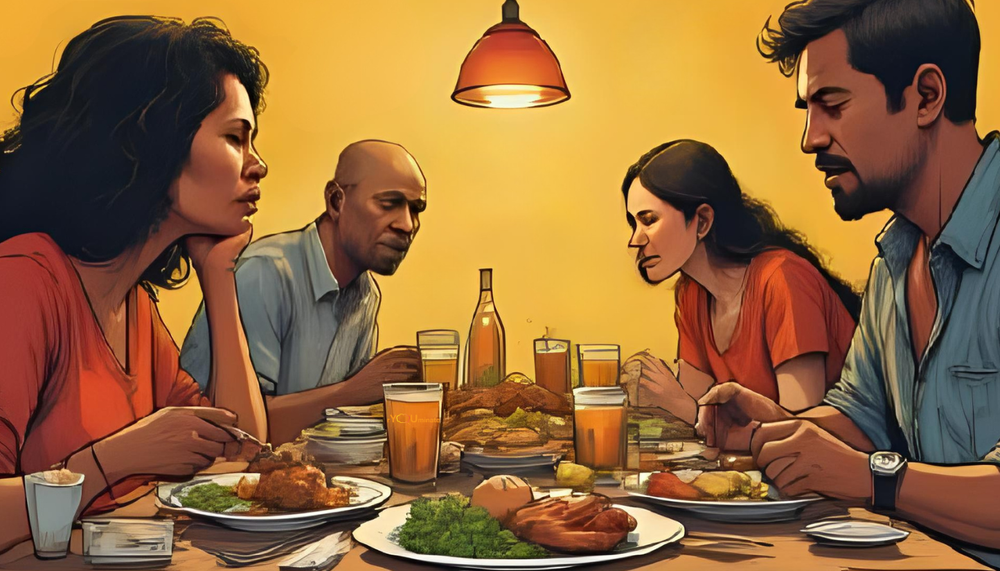
Do these sentences resonate? 👇
- “I feel like my parents just don’t get what I’m going through.”
- “We keep having the same arguments, but nobody’s really listening.”
- "Trying to talk to my family about stress just leaves me more stressed.”
Picture this: after a tiring day, you're scrolling on your phone while your parent calls you from another room. Every conversation feels loaded, like one wrong word could light the fuse—especially when everything from global news to TikTok is shouting about mental health, politics, or identity. Finding any real common ground at home feels next-level hard.

“Where we meet might be halfway—what matters is that we’re both still walking.” — José Olivarez, Latino poet
What are families disagreeing about right now? 🤔
Right now, family tension is at an all-time high.
Recent research shows just 11% of Gen Z report familial strain over political differences, though this is actually twice as high as older generations like Gen X (6%) and Boomers. However, the most revealing data comes from family communication studies: when asked what they most wish their parents understood about them, 19% of Gen Z mentioned their feelings and emotions, while 10% cited their need for independence.
Politics tops the list of family conflicts, with 31% of Americans reporting political disagreements with family members. But beneath the surface, the real friction often stems from deeper value differences: whether therapy is "for us," if challenging adults means disrespect, the pressure to translate or fix things in first-gen homes, or if college is worth it versus helping provide at home.
The data shows that 45% of Gen Z feel stressed and 38% feel anxious on any given day, while 94% also feel happy—revealing the complex emotional landscape that makes family conversations challenging.
How does this hit BIPOC, first-gen, or low-income families differently?🧑🏽🎓
- Extra weight: Cultural norms might say, “Don’t talk back,” or “Family comes first, no matter what.” For many, speaking up feels risky.
- Family roles: If translating for parents or handling “grown-up” stuff is part of life, it gets even trickier to share big feelings.
- Guilt & gratitude: If parents sacrificed for a new country or stability, self-advocacy can feel selfish.
- Money stress: Arguing about saving versus spending, school versus work, or who gets the final say? That’s survival mode kicking in.
Even more, show that LGBT respondents have 166% higher chance of experiencing family conflict than their heterosexual counterparts, highlighting how identity adds another layer of complexity.
Why do these conversations feel so hard?⏳
- “Respect your elders” and “be grateful” are drilled in, sometimes shutting down hard but honest conversations.
- There’s pressure to keep conflict or struggles private, especially around identity and mental health.
- Silence and shame linger in topics that don’t fit tradition—many BIPOC and first-gen youth carry both love and frustration.
What does Gen Z want from these convos?
Research shows 80% of Gen Z find conversations with their parents helpful, but over 40% of parents don't find it easy to discuss emotions or social media. Stats show it's not about proving who's "right." Most Gen Zers would rather be respected for their lived experience than agreed with on every point.
Community, trust, and seeing each other's struggles — these are at the top of the wish list.
Ways to Break the Ice (and the Cycle)
Finding common ground isn’t about winning. Honesty, tiny steps toward compromise, and sometimes awkward patience matter most.
✨ Try mixing in:
- Wait for a pause when neither of you is raging or wrapped up in a crisis.
- Start with a low-stakes share: “I want to feel heard, not just ‘right’ or ‘wrong.’”
- Speak in feelings, not accusations. “When this happens, I feel...” will land better than, “You always…”
- Ask a real question about your parent’s outlook, like what they wish you knew.
- If it gets heated, suggest, “Let’s take a break and come back to this,” instead of powering through.
- Bring in something relatable: a show, video, or friend’s story that fits both worlds.
- Celebrate every little “we talked and survived” moment, even if nothing big changed.
Example phrases to try:
- Picking your moment: Try talking when no one’s already upset.
- Naming your hope: “I want us to feel closer, even if we don’t agree.”
- Focusing on feelings: “When X happens, I feel…” instead of “You always...”
- Asking real questions: “What do you wish I understood about your world?”
- Connecting over shared values: Go for “We both want to be safe/happy/proud,” even if the details differ.
- Using relatable examples: Share a social post, video, or story to show where you’re coming from.
- Respecting pauses: Step away if emotions spike—try again later.
The data tells us what's happening—but your lived experience matters more than any statistic. Let's get real about where you are with your family right now.

“Validation is not agreement. It’s showing, ‘I hear you—even if I see it differently.’” — Dr. Mia A. Smith Bynum, Black clinical psychologist
Let these questions guide YOUr next step — for real change, not just more noise:
- What’s one thing YOU wish your family truly understood about YOU right now?
- When was the last time YOU felt genuinely heard in a family talk? What made that happen?
- How do YOU usually respond—shut down, get loud, or try to keep the peace—when tensions rise?
- What’s one family value or tradition YOU still respect, even if you don’t always agree?
- If YOU could script the perfect family talk, what would YOU say, and how would YOU want to feel afterward?

“Progress is rarely a straight line. There are always bumps in the road, but you can keep going.” — Kara Wai, Hong Kong actress and mental health advocate
Click on the dropdowns below to see the easy action items:
Do one of these things TODAY 👇
- Share a vibe: Send a silly meme or TikTok to a parent — no big talk needed, just a simple “thinking of YOU.”
- Name the good: Write down three things you actually appreciate about your family, whether you share them or simply keep them in a journal for yourself.
- Refuel solo: Take a walk, enjoy a snack, or indulge in your favorite playlist by yourself. Sometimes the best reset is prioritizing your own downtime.
Say one (or all) of these affirmations out loud 👇
- “I can stay true to myself and be open to others’ truths.”
- “My boundaries matter, and so does our relationship.”
- “We don’t have to agree to respect one another.”
- “I’m patient with myself and my family during hard times.”
- “Each small step is progress, even if it isn’t perfect yet.”
Channel that feeling 👇
Feeling stressed? If things get rough, step out, get air, or listen to a comfort song.
Feeling relieved? If there’s even a small, warm moment, treasure it — send a grateful emoji or say an awkward thank you.
Feeling neutral? If nothing shifts today, reflect and regroup. You’re still building the skill.
Some vibes to close us out
Building common ground means mixing up patience, honesty, and a willingness to get a little uncomfortable (sometimes a LOT uncomfortable). Most real change comes from showing up again and again, not just waiting for one big breakthrough.
If YOU celebrate: Happy Hispanic Heritage Month!
If YOU’re tired: give YOUrself credit for every bit of brave effort.
If YOU’re growing: keep going, and remember—
YOU got this. 💭✨
Sources
- "Gen Zers to Their Parents: When We Are Upset, Just Listen" - Gallup (2025)
- "Study explores what families fight about: Communication, moods, and chores" - University of Illinois (2024)
- "Generation Z and the Transformation of American Adolescence" - American Survey Center (2025)

Dig into this topic deeper by signing up for our FREE newsletter.
You'll be able to download the reflection worksheet to put all these actions into one page.
Once you're in, come back to this page and download your new go-to resource.





